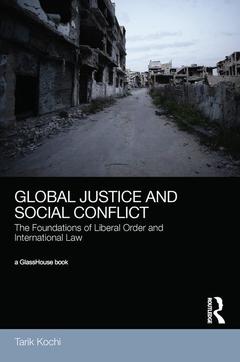Description
Global Justice and Social Conflict
The Foundations of Liberal Order and International Law
Author: Kochi Tarik
Language: English
Subjects for Global Justice and Social Conflict:
Keywords
Global Liberal Order; Social Reproduction; Good Life; social conflict; Global Constitutionalism; neoliberal rationality; UK’s Exit; international law; Mare Clausum; Constitutional Antagonism; TNS Apparatus; Social Democratic Regulation; Transnational Capitalist Class; Global Constitutional Order; Human Suffering; Liberal Cosmopolitan; Mare Liberum; Private Property Relations; Liberal Peace; Constituent Power; Liberal Pragmatist; Global Liberal; Fiscal Military State; Ius Gentium; Hugo Grotius; Grotius; Subjective Natural Rights
Publication date: 10-2019
· 15.6x23.4 cm · Paperback
Publication date: 10-2019
· 15.6x23.4 cm · Hardback
Description
/li>Contents
/li>Biography
/li>
Global Justice and Social Conflict offers a ground-breaking historical and theoretical reappraisal of the ideas that underpin and sustain the global liberal order, international law and neoliberal rationality.
Across the 20th and 21st centuries, liberalism, and increasingly neoliberalism, have dominated the construction and shape of the global political order, the global economy and international law. For some, this development has been directed by a vision of ?global justice?. Yet, for many, the world has been marked by a history and continued experience of injustice, inequality, indignity, insecurity, poverty and war ? a reality in which attempts to realise an idea of justice cannot be detached from acts of violence and widespread social conflict. In this book Tarik Kochi argues that to think seriously about global justice we need to understand how both liberalism and neoliberalism have pushed aside rival ideas of social and economic justice in the name of private property, individualistic rights, state security and capitalist ?free? markets. Ranging from ancient concepts of natural law and republican constitutionalism, to early modern ideas of natural rights and political economy, and to contemporary discourses of human rights, humanitarian war and global constitutionalism, Kochi shows how the key foundational elements of a now globalised political, economic and juridical tradition are constituted and continually beset by struggles over what counts as justice and over how to realise it. Engaging with a wide range of thinkers and reaching provocatively across a breadth of subject areas, Kochi investigates the roots of many globalised struggles over justice, human rights, democracy and equality, and offers an alternative constitutional understanding of the future of emancipatory politics and international law.
Global Justice and Social Conflict will be essential reading for scholars and students with an interest in international law, international relations, international political economy, intellectual history, and critical and political theory.
CONTENTS
Acknowledgments
Introduction: Justice, Liberal Order and International Law
1 The ‘Failures’ of the Global Liberal Legal Order
International Law in Crisis?
Liberal Pragmatism and Moral Humanitarianism
Global Liberal Order, Global Security, Globalised Terror
Contained Prosperity, Global Inequality
Transnational Power, Transnational State Apparatuses, Transnational Law
2 Natural Law, Natural Rights and Property
Between Human Fellowship and Unsocial Sociability
Aristotle, the Stoics and Property
Cicero, Private Property and Belligerent International Law
From Natural Law to Natural Rights – Gratian, Aquinas, Ockham
Hugo Grotius and Contradictory International Law
Kant, Unsocial Sociability and Illegitimate Colonial Property
3 Liberalism, Violence and Inequality
A Paradox of Property
John Locke and the Right to Accumulate
Gerrard Winstanley, Illegitimate Property and Common Preservation
Rousseau, Virtue and Inequality
Adam Smith, Opulence and the Liberal Justification of Economic Inequality
The Pin Factory and the War Factory
War and Violence within Liberal Political Economy
4 Justice and Constitutional Antagonism
Constitutional Antagonism
Aristotle and Class Conflict
Polybius, Livy, Cicero and Constitutional Conflict
Machiavelli, Neo-Greek and Neo-Roman Republicanism
From Liberty to Liberalism – David Hume and James Madison
Hegel, Struggles for Recognition and the Ethical State
Marx and the ‘Republic of Labour’
Social Reproduction as Struggle – Benjamin, Gramsci, Poulantzas
Critical Theory and Social Antagonism
5 A Global Constitutional Question
Questions of Democracy and Legitimacy
Overlapping Global Constitutional Projects
The Danger of (Neo)Liberal Cosmopolitan Global Constitutionalism
The Public Role of International Law
Bibliography
Tarik Kochi is a Senior Lecturer in the School of Law, Politics and Sociology at the University of Sussex, UK. He is the author of The Other’s War: Recognition and the Violence of Ethics (Birkbeck Law Press, 2009) which was awarded the 2010 International Studies Association, International Ethics Section, Best Book Award.
These books may interest you

Global Justice in East Asia 48.88 €

Global Justice in East Asia 160.25 €


